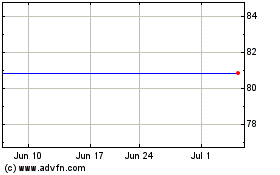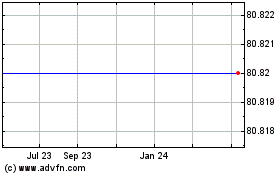St Jude Phases Out Defibrillator Cables Amid Insulation Issue
December 16 2010 - 2:15PM
Dow Jones News
St. Jude Medical Inc. (STJ) is taking a group of defibrillator
cables off the market amid signs an older insulating material is
more vulnerable to problems that could cause malfunctions, which
has long been an industry challenge.
The St. Paul, Minn., device maker discussed the issue in a
letter to doctors dated Wednesday while saying that cables with a
newer coating have a lower rate of issues. These newer cables have
already all but replaced the older ones on the market, representing
97% of sales, St. Jude said.
The company recommended doctors continue regular monitoring of
patients with the "Riata" brand cables at issue--of which 227,000
have been sold world-wide--while doing some specific testing if
they suspect lead failures. A company spokeswoman said the Food and
Drug Administration doesn't view this as a recall at this time; an
FDA spokeswoman was unable to immediately comment on the matter
Thursday.
The company does not recommend that doctors preemptively remove
these cables, which can be a complicated procedure. St. Jude said
its medical advisory board agrees with these recommendations.
At issue are the "Riata and Riata ST" family of leads, or cables
that connect defibrillators to the heart, with silicone as an outer
insulation material. St. Jude's letter to doctors said there was a
0.47% rate of "insulation abrasion" over nine years of use in such
leads, and that a planned phase-out will be completed by the end of
this year. This type of insulation compromise can interrupt the
cables' ability to sense rhythm problems in the heart, which can
cause defibrillators to fire shocks when they aren't needed or to
not provide shocks when they are needed, both of which are
potentially life-threatening problems.
St. Jude noted in the letter that underreporting of
complications with defibrillator leads "is well acknowledged
throughout the industry," and that the statistics should be taken
in that context. St. Jude competes in the roughly $12 billion
market for heart-rhythm devices with Medtronic Inc. (MDT) and
Boston Scientific Corp. (BSX).
Arnold Greenspon, who directs the electrophysiology lab at
Thomas Jefferson Hospital in Philadelphia, said he didn't consider
this a major issue given the rate of problems cited. He said a St.
Jude representative notified him about the matter on Wednesday.
The company told doctors that newer leads with a type of
insulation it calls "Optim"--sold with Riata ST Optim and Durata
leads--have demonstrated a better than 80% reduction in
"abrasion-related observations" after 44 months compared with
silicone leads. The Optim insulation involves both silicone and
polyurethane.
"The insulation is the weakest link" for defibrillator leads,
said Haris Haqqani, an electrophysiologist at the Hospital of the
University of Pennsylvania, also in Philadelphia. He said the
industry at large has been working to get away from coatings that
were developed for other applications in favor of materials
specifically designed to handle the bending, strain and other
challenges leads face inside the body.
St. Jude's Riata-brand leads have been in the news before. There
were some concerns among doctors three years ago, shortly after a
Medtronic recall of fracture-prone "Sprint Fidelis" leads, that
Riata leads were poking holes in hearts. St. Jude at the time said
its monitoring didn't show signs these cables were linked to more
perforation problems than any other defibrillator leads.
St. Jude shares were recently up 0.6% to $41.97.
-By Jon Kamp, Dow Jones Newswires; 617-654-6728;
jon.kamp@dowjones.com
SJM (NYSE:STJ)
Historical Stock Chart
From Jun 2024 to Jul 2024

SJM (NYSE:STJ)
Historical Stock Chart
From Jul 2023 to Jul 2024
